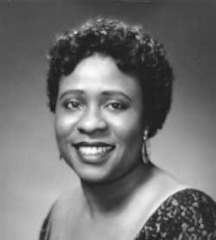Fannie Mae Duncan facts for kids
Fannie Mae Duncan (1918-2005) was an inspiring African-American businesswoman and community leader. She lived in Colorado Springs, Colorado. Fannie Mae is best known for owning the Cotton Club. This jazz club was one of the first places in Colorado Springs to welcome people of all races. It was named after the famous Cotton Club in Harlem.
In 2012, Fannie Mae Duncan was honored. She was added to the Colorado Women's Hall of Fame. She received this award for her brave efforts. Her actions helped bring people of different races together peacefully in Colorado Springs.
Contents
Early Life of Fannie Mae Duncan
Fannie Mae Bragg was born on July 5, 1918. Her birthplace was Luther, Oklahoma. Her parents, Herbert and Mattie Brinson Bragg, worked as sharecroppers. This meant they farmed land owned by someone else. Fannie Mae was one of seven children. All the children helped with the farm work.
From a young age, Fannie Mae loved to help sell produce at the farm stand. Her father saw her talent for business. He encouraged her to follow this interest. In 1926, her father, Herbert Bragg, died. He passed away from injuries after a car accident.
Her sister, Frances Bragg-Payne, was the first to move to Colorado Springs. She then sent for the rest of her family. Fannie Mae's mother moved the family to Colorado in 1933. This included her brother, Cornelius Bragg. Five years later, Fannie Mae made history in her family. She was the first to graduate from high school. She attended Colorado Springs High School.
Fannie Mae's Business Career
During World War II, Mrs. Duncan worked with the military. She was in Colorado Springs. At Camp Carson, she opened a soda fountain. This was at a place called Haven Club. It was set up for African-American soldiers.
The famous comedian Flip Wilson was stationed at Camp Carson. Fannie Mae said she gave him his first chance to perform. She also opened a United Service Organizations (USO) center. She convinced the city manager to give her a business license. At that time, it was very rare for African-Americans, especially women, to own a business on a military base.
The Cotton Club: A Place for Everyone
In 1948, Duncan opened The Cotton Club. Her goal was to serve everyone, no matter their background. Her customers included soldiers and their wives. Many famous musicians played at her jazz club. These included Duke Ellington, Etta James, Lionel Hampton, Mahalia Jackson, Billie Holiday, Muddy Waters, and Count Basie.
At that time, many hotels in the city would not serve African-Americans. So, Fannie Mae bought a historic mansion. She used it to provide lodging for performers and visitors. Even important figures like Medgar Evers stayed there.
It was common for Black people to enter restaurants through back doors. They often had to sit in balconies at theaters. But Fannie Mae had a different vision for her business. She wanted to serve people of color. She also wanted to serve white people. She felt that denying white people entry to the Cotton Club would be wrong. It would deny their rights.
This idea caused some problems with local authorities. But Fannie Mae stood firm. She peacefully created a club where all races could mix. One person who was concerned was I.B. Bruce, the police chief. He was nicknamed "Dad." Bruce became a good friend of Fannie Mae's. He helped make sure there was no trouble at her business.
Fannie Mae made a deal with Chief Bruce. Patrons could mingle freely without problems. In return, Fannie Mae would tell them if she saw a customer they were looking for. To keep everyone safe, she did not serve people who were disruptive. She also hired her own security team. To show her commitment to inclusion, she had a permanent sign in the club's window. It read, "Everybody's Welcome."
The Cotton Club closed in 1975. This was due to a city project called urban renewal. Fannie Mae tried to open the club at a new location. However, it was not successful.
Fannie Mae's Community Work
Fannie Mae was very active in community groups. She was often the first woman to join these organizations. She made a big difference in the city. For example, she donated the first iron lung to Colorado Springs. An iron lung was a machine that helped people breathe. She also raised money for medical research.
She helped start the Sickle Cell Anemia Association chapter in the city. She also co-founded the 400 Club, a giving group. Fannie Mae helped many young people go to college. She was a mentor and a great role model for others.
Death and Lasting Legacy
Fannie Mae Duncan passed away on September 13, 2005, in Denver. She did not have her own children. However, she had close relationships with many nieces and nephews. In her later years, she raised one of her nieces. She cared for her from infancy into adulthood. Her husband, Edward Duncan, died in 1957. He had worked as a Pullman porter for the railroad.
Today, an annual event honors Fannie Mae Duncan. It is a multicultural event called "Everybody Welcome." It celebrates her business and community work. In 2012, Fannie Mae was inducted into the Colorado Women's Hall of Fame. She was recognized for her important role in helping people of different races come together.
 | Roy Wilkins |
 | John Lewis |
 | Linda Carol Brown |


